#is this profound? is the autism making me fixate too much on things that are not meant to be taken that literally? I can't tell!
Text
Capitalism and Confederate Gold, or: I Develop Brainworms about One Specific Line in the Showdown Scene of The Good, The Bad and The Ugly.
There's one line in the showdown scene that has confused me for awhile.
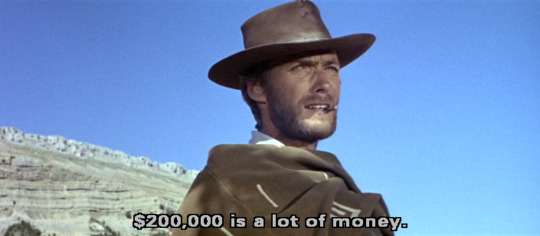
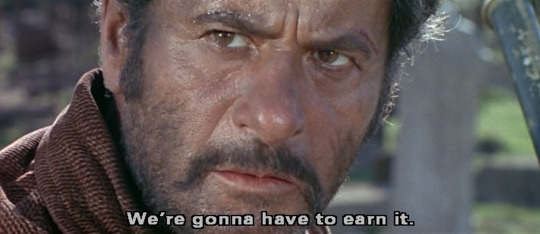
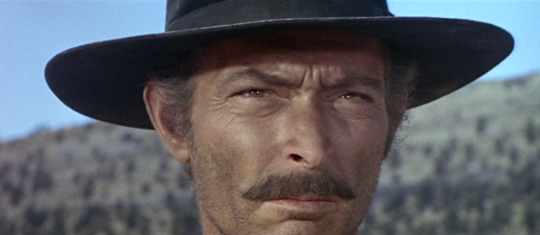
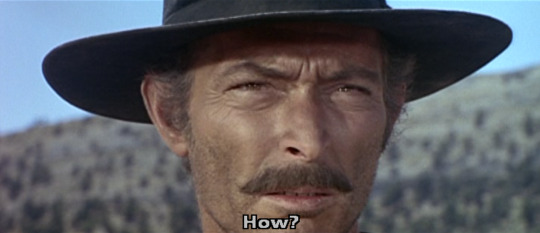
"200,000 dollars is a lot of money. We're gonna have to earn it."
What is he talking about!!!
"We," he says, as he forces them into an uneven three-way standoff, already knowing that he's going to psyche out Angel Eyes by splitting his focus two ways and then take half the money and tie up Tuco until he's out of reach.
Moreover it seems weird to me because out of nowhere this extremely good old-fashioned American hard-working capitalist sentiment comes out, that they'll have to earn this money. When in fact they are three random dudes swooping in like pirates to snatch up some unattended money that none of them actually earned. 200,000 would be a large sum of money even by today's standards! Adjusting for inflation, this is a near-inconcievable fortune. This was (confederate) government money. Very few civilians would have had anywhere near this much money: the 1%ers at the time, similar to today, were not people who had somehow earned all of that money by themselves; they were factory owners whose earnings were generated by hosts of poor factory workers, plantation owners with slaves working their fields. Powerful men who owned land or businesses worked by others. This isn't the kind of money one guy just ends up with, without exploiting a huge amount of power.
The oddest thing about this to me is that if any one single man out of the trio could be said to have "earned" that money, it would be Angel Eyes. Whereas Blondie and Tuco stumbled accidentally into the quest for the gold and managed to keep an advantage through desperate ad-libbing, grit, and firepower, Angel Eyes did research. He worked at this long term. He found out about the gold through his job (which already had him a "small business owner," if you will; ie the leader of a gang who did a bulk of his dirty work for him) and quickly discovered all the information about it which he could, eliminated his competition for it and went on the hunt. Angel Eyes did detective work! He looked up the half-soldier for information, he found Jackson's old lover and beat her up on the worst day of her life for information, when nothing else worked he got a position in a prison camp where he'd be around large numbers of confederate soldiers and had, statistically, a better chance than anywhere else of finding Jackson or any more information about the gold. And then he set up a racket of beating up and interrogating soldiers and stealing their valuables to keep making money in the meantime! A real entrepreneur if you will, where Blondie was just a scammer.
Blondie and Tuco's entire adventure was one lucky break after another. It was pure chance, perhaps influenced by something supernatural (see "carriage of the spirits,") that brought them into the story at all. But by the time Angel Eyes found them in the camp, he'd put in a lot of work by himself tracking down leads about the gold. Tuco and Blondie showing up right on his doorstep was his first lucky break: everything else he'd done himself. And, being Angel Eyes, he was in a very good position to take advantage of his luck. He'd prepared for this, he was used to secretly moving around prisoners, he had his gang nearby ready to go.
When Blondie says they'll have to earn the money I almost see it as a subtle mockery of Angel Eyes. That Angel Eyes doesn't deserve the money because he's a bad person. Maybe he "earned" it by the rules of the game, but a man who plays like that doesn't "deserve" nice things, even if that's just how the world works. And Blondie, a man just as ruthless and cunning, enough to stand up to him as his equal, is going to take it away from him.
"We're gonna have to earn it," says Blondie about an unthinkably huge sum of money which could not under normal circumstances have been earned by one man, mocking the man who came closest to "earning" it, and whom Blondie already knows he is going to cheat. (Angel Eye's "How?" is pretty funny with this interpretation.)
Now, maybe I'm overthinking this and Blondie considers that he's earned the money by being smarter than Angel Eyes and tough enough not to die in the desert. Maybe the ending is meant to be a fairy story about how, just this one time, the lesser evil ended up with the money instead of the worse guy; the winner actually was someone who, morally, "deserved" it more. Maybe it's literally not that deep: Blondie is starting his mind games that will give him a psychological advantage in the upcoming standoff. He wants them confused. What the fuck is he talking about? Why "we?" Is he cooperating? Is he not? Is he going to shoot me? wtf is he talking about? He doesn't know either and he doesn't want you to know!
I don't think any of this is necessarily an intended reading, just something that's been bouncing around in my head and needs out. Anyone else have thoughts?
#is this profound? is the autism making me fixate too much on things that are not meant to be taken that literally? I can't tell!#long post#the good the bad and the ugly#personal (ok to rb)#meta ?
42 notes
·
View notes
Text
A Study in Sunny
When asking how much of an impact television shows have and why they are so important to us, I’m sure the latter is a question that’s lingered in the minds of many parents concerned with their child’s obsessions with various things, whether that be bands, actors, sports stars or TV shows. I know I for one have endured the embarrassment of my dad bringing up my new hyper fixation at family dinners or my friends roasting me for whatever new poster I’ve just bought. Even before I planned on writing this article, I think I’ve always known my short-lived obsessions or long time loves have always been deeper than superficiality. (Maybe my High School Musical phase can be excluded from that, though).
I think there’s a lot more to what we watch that makes us cling so hard to our shows, and that they genuinely have a huge influence and emotional impact on our lives. A few people I’ve talked to or seen online think that my generation’s attachment to fiction universes is a bad thing, which to an extent I can understand. However, at the risk of sounding dramatic, I truly believe TV shows have unimaginable impacts on us.
Whether that’s simply making us laugh until our sides hurt or allowing us a brief distraction from our messy lives there’s so much that shows offer us than just entertainment. Whether you find solace in living vicariously through your favourite character or simply enjoy being able to relate to a situation close to your heart, why should it matter what others think? How could we not hyper-fixate on something that to some extent reflects who you are and what you find compelling about life? And really, who’s to say that doing so is detrimental when to some, a show could be their only outlet to express themselves? I don’t know about you, but I can’t see anything wrong with that at all.
While its all well and good me saying all this, I thought I needed proof. I want to prove that TV shows touch people in many different ways and have the ability to improve lives, and that to many, tv shows mean so much more than what they are on the surface. The only way I was going to prove it, however, is with evidence. So I did a little research.
One of my favourite TV shows of all time is It’s Always Sunny in Philadelphia. Rated 98% on Rotten Tomatoes, it’s millions of committed fans and numerous awards make it one of the most popular sitcoms of all time. It’s extremely dark and controversial humour torpedoes taboo topics in the most hilarious and ridiculous scenarios, yet remains subtly brilliant in the way it presents itself and it’s characters. If you haven’t seen it, (in which case the rest of this post will probably make no sense and I’d advise you to binge it, right now), the show centres around five terrible friends who run an equally terrible bar in downtown Philadelphia.

I decided to run a survey about how Always Sunny has affected its fans. I chose this show in particular because each character is so complex and profound in their own right I can see how easy it is for many people to connect with them on such personal levels.
I think the thing I found funniest when starting this show is that the characters are seemingly just really bad people. Every member of the gang has been arrested for something, they’re all alcoholics, they’re constantly thinking of new get-rich-quick schemes and regularly ruin other people’s lives without a second thought. In a most extreme example, my brother can’t even watch the show simply because he genuinely hates the characters (which all in all, is fair enough.) However, I believe beneath the surface of the arguments and violence there’s a depth to every character that you don’t always see in light-hearted comedies.
“They are the most elaborate, multi-dimensional, complicated and most well-written characters in any show ever, especially comedy.”

The characters are all very different. While Dennis is constantly harassing women and plotting against his family, he’s also extremely insecure and vulnerable. He was diagnosed with borderline personality disorder in season ten, which leads to him often being shown to struggle with his emotions and ability to feel. He’s an incredibly complex character who I think is often just overlooked as the psychotic angry man, which isn’t true at all.
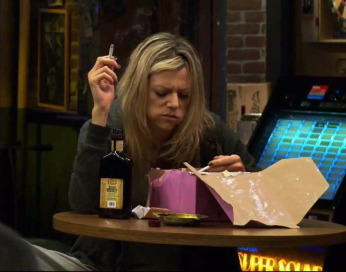
His sister Dee entertains the more slapstick and needy version of her brother. She too is very easily agitated and has no patience, as well as she’s always desperate for validation (where most of her humour stems from). Because of this, she is immensely guarded of her emotions, also due to the perpetual verbal abuse she’s endured from her family her entire life.
“I can relate to her past with being bullied, and her constant need for affection and to be told that she is good.”
Mac, on the other hand, wears his heart on his sleeve. His development of starting the show as a heavily religious closeted gay man to openly out and proud over 12 years was really inspiring to watch, and his father issues and struggles with acceptance is what makes him one of the most engaging and interesting characters.

His best friend Charlie is also fascinating. On the surface, he is a substance abuser and alcoholic, unhygienic, illiterate, and highly unpredictable. But beyond that, he is very loving and supportive (most of this time). He adores Frank and is usually happy to do anything for his friends. As a sexual abuse survivor, he is such an important character because it’s clear especially in the later seasons that he truly loves and believes in himself, and regardless of how others see him he never attempts to change who he is. Not only that, but many fans believe he’s autistic meaning his character is not only lovable but awesome representation.
A few months ago I launched a survey that 206 wonderful people responded to. Even though I’m involved with the Always Sunny community every day through social media, it really helped me get an understanding of the bigger picture, rather than just memes and discourse (although I wouldn’t change the Sunny Tumblr fandom for the world). So before I dive in I want to thank everybody that took the time to respond to the survey or talk to me privately, as you’ve helped everyone that reads this gain more of an insight into It’s Always Sunny in Philadelphia and it’s amazing fanbase, which I appreciate tremendously.
(And before I start, the overwhelming majority classed themselves as being obsessed with the show, and almost 100% have dedicated some form of social media to it, so you know these results are the real deal.)
While many people, like I do, watch the show on their own, over half watch it with friends and 49% say watching the show helps them bond with someone. I thought this was quite interesting because whether it’s your friends, parents, siblings or anyone else, if a show brings people together it really can only be a good thing, especially a comedy show.

I think a lot of people don’t realise how important tv shows are to relationships. I once knew someone who told me the only time they ever spent with their father was when they watched their favourite programme together. This shows how powerful tv shows are – to some, they’re vital for bonding and spending time with someone you love. They allow you the opportunity to do something fun which inspires conversation and communication, things not always easy to achieve.
While this is really important, there are three main things that stood out in this survey as the most relatable and helpful to fans. Charlie’s autism, Mac’s sexuality, and Dennis’s BPD. After reading the results it became obvious that so many people relate really strongly to these characters, each one holding something personal to every different person who watches the show.
“I really like Charlie because he very accurately portrays a dyslexic person and I think that’s really great. I also really like Mac because I can relate to him being very closeted so his progression to acceptance of himself was really nice to see for me, so his storyline, as problematic as it may be, I do find to be very realistic and relatable. I can also relate to Dennis in a really dark way, with the borderline personality disorder, so he also has a special place in my heart.”
Predictably, ‘Who is your favourite character?’ is one of the questions I asked, and this is what came back.
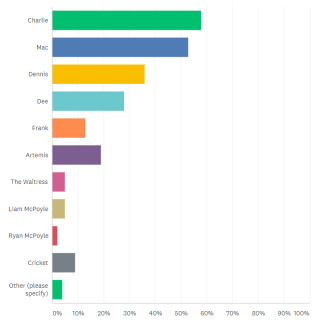
Charlie had the most votes with 58%, while Mac wasn’t far behind with 53%.
(And whoever gave a notable mention to special agent Jack Bauer and Poppins the invincible dog, I love you.)
As you can see, Charlie and Mac are the clear favourites. ‘Wild Card’ Charlie has attained number one though and has been a fan favourite for a long time. While there are hundreds of reasons to love him (he’s my favourite too), I think most people just see him as the funniest character. (Which is completely justified). However, apart from his humour, which obviously a lot of viewers adore, there are many other reasons fans love Charlie Kelly and the other characters so much.
Something I found interesting was quite a few responses mentioned Charlie’s autism. While it’s never been explicitly stated in the show that autism is definitely a condition he has, it’s something many fans have speculated about. It’s pretty much confirmed Charlie is autistic due to certain things he does or certain personality traits he has, explained brilliantly by Reddit user carrionkid in this post.

“I really like how his character is almost certainly autistic. It helps me realize that it’s not something that I should be ashamed of, and I also really like the way he’s played and written in general, and his musical talent! I find a lot of comfort in the ways he’s similar to me. I relate so strongly to that feeling of being left out and trying really hard to make your friends like you.”
Charlie is obviously a character that some fans have a deep connection to. Autism isn’t often portrayed well or accurately on-screen, and well-developed characters like Abed Nadir in Community and JJ Jones in Skins are very rare. Frankly, representation of various mental conditions is majorly lacking in the film and television world. So to see someone as complex and engaging as Charlie Kelly is really refreshing and important in the progression of television.

“I find Charlies’s autism symptoms make me feel more comfortable and accepting of myself as I might not be otherwise, due to past experiences with people telling me that I am not autistic despite my diagnosis (even though these comments were motivated by bigotry towards minorities I fit into I still find it hard to ignore them).”
Characters like Charlie show how much of an impact TV shows can have. Being able to relate to a character is a really big deal – finding something like a show that seems so unimportant, yet turns out to be something genuinely helpful in accepting who you are and being less lonely is really special. I think the personal connections between characters and viewers are underrated. At a certain point, they stop being characters, and you see them as yourself. Albeit a more exaggerated, problematic version of yourself, I suppose.

Probably the biggest thing that a huge amount of people responded to is Mac’s sexuality, and his troubles with learning to accept and love himself as an extremely religious gay man.

“Mac became a favourite [of mine] since at the time I was very closeted and so was he, and I felt protective of and comforted by him.”
If I’m totally honest, there were times in the first few seasons I really didn’t like Mac, but I think it just took me a while to understand him – Mac is a very dramatic guy, simply because he expresses his emotions so outwardly while the rest of the gang often struggle to. He tries to hold nothing back and is very open with who he loves, and I think this is why it was so heartbreaking to watch him suffer from his internalised homophobia and closeted sexuality.
There were so many people on this survey talking about how much they relate to him. In fact, when asked what kind of things in Alway Sunny has helped people with on a personal level, a third of respondents said Mac’s sexuality, and 38% said the show’s acceptance of their LGBTQ+ characters.
This slideshow requires JavaScript.
The writers and creators (Glenn Howerton, Rob McElhenney and Charlie Day who incidentally play the characters of Dennis, Mac and Charlie) confirmed that each member of the gang is bisexual, while Mac himself is homosexual. This kind of representation, even though the topic was addressed off-screen, is still important for diversity and providing safe, inclusive characters for viewers to watch that aren’t harmful to the LGBTQ+ community or at risk of being killed off. In the unfortunate television culture now where LGBTQ+ characters are constantly under threat from the ‘Bury Your Gays’ trope, it’s so important to have such a well-developed, funny, human character like Mac around, who is happier than he’s ever been and isn’t going anywhere.
“The pay-off of him finally coming to terms with his sexuality was refreshing in the way that it didn’t become the butt of a joke or change the nature of his character completely.”
It was really emotional to see people responding to the survey who have grown up in unaccepting, extremely religious families who found solace in witnessing Mac’s journey and finding hope in his coming out arc. It really is wonderful to see how comforting Mac is to people having a hard time and who may not have anyone else to relate to.
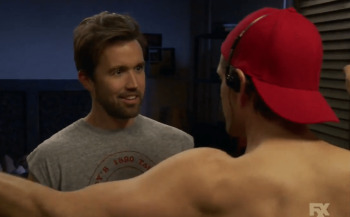
“Mac’s character development resonated with me. Even though it was over the top and exaggerated in the show, the extreme Christian life of a closeted gay person and falling in love with your best friend was relatable.”
It’s been a running element of the show for a long time that he’s very much in love with Dennis, and whether their relationship is another case of queerbaiting, a simple gag that won’t actually amount to anything, or the longest slow burn relationship ever, Mac is still awesome representation and an amazing character who embodies many of the struggles and hardships real people face every day. And he’s an example of someone who overcame all of it.
While the gang have earned themselves a reputation for never giving a shit about each other, it’s pretty clear deep down they do all love one another. To see the gang unfazed by and supportive of Mac’s sexuality, (especially given Charlie and Mac have been best friends their entire lives and Charlie tells him he’s always known) is clearly very comforting and inspiring to a lot of viewers afraid of coming out.
This slideshow requires JavaScript.
I recently chatted with awesome Tumblr user Sunnystruck. On her blog she explained the importance of Mac’s storyline way better than I ever could:
Mac’s coming out arc is so unique and personal to me because it’s one of the very rare instances of fictional coming out arcs that doesn’t involve a romance as the transformative catalyst for a character embracing their sexuality or coming out.
Even when everyone else knows and recognizes that Mac is gay, he still has to figure out how to get there on his own terms. It takes him so long, and then to see him love and embrace that decision about himself is so refreshing. He comes out and celebrates his gayness openly and because he spent so fucking long getting to that point and so much time wrestling with it in terms of what it meant for his identity and his image – which again, are completely personal.
It took him a long time to love a part of himself. And that’s truly a kind of representation that gets to me.
Even though I came out to my friends and immediate family I’m still navigating how to embrace that around them and seeing Mac be so gay in some episodes makes me feel so normal. He’s really fucking gay and it shows, and I can relate to that. And he still took his time and that means so much to me especially in an age where straight people claim to have gaydar and say they’re waiting for someone to come out but it’s not their call you know? It’s ours. They don’t dictate our stories, we do. That means something.
Meanwhile, Mac and Charlie aren’t the only ones who struck a chord with viewers. Dennis also got a lot of attention from fans, mostly, I found, because of his borderline personality disorder.
Dennis has always shown signs of extreme mental illness. He is immensely manipulative and cold, often being compared to a rapist and serial killer. While claiming to be completely emotionless (which most of the time, he is), Dennis is prone to extreme bouts of rage. While these moments are funny to watch, Dennis’ behaviour has always signalled to something more serious, and in season 10 he was diagnosed with borderline personality disorder.
“I relate the most to Dennis because before getting treatment for DID and BPD I was very similar to him.”
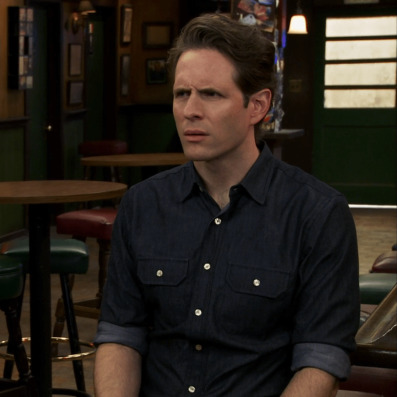
For those who don’t know, BPD is a disorder of mood and how a person interacts with others. While there are many causes for developing BPD, a prevalent one is traumatic events which occur during childhood. Many people with BPD have experienced parental neglect or physical, sexual or emotional abuse during their childhood. This would make sense for Dennis, as he and Dee often describe the way in which Frank is a terrible and emotionally abusive father. Not only that but in the eleventh season Dennis reveals he had sex with the middle-aged school librarian, Mrs Klinsky, when he was 14. Despite his insistence he wasn’t raped, the experience seems to have been very traumatic and has left obvious scars. These factors probably contributed to his emotional issues and extensive mental illness.
“I don’t “relate” to Dennis but his trauma and the way it manifests has been really helpful for me in dealing with my own trauma.”

Dennis is an extremely complicated character, who may at first seem impossible to relate to, as his personality and behaviour are extremely complex. Despite this, or maybe because of this, a lot of people relate to him on many different levels. Some respondents said they also have difficulty comprehending social boundaries or emotional relationships. Some said that simply seeing a character be diagnosed with a condition they have is extremely comforting and helpful.
“I relate to Dennis in him having BPD. I didn’t even really know it was a thing until he was diagnosed with it, then I looked into it more to understand it and realized (to my horror, confusion, and ultimate relief) that he had the same thing as me.“
While in some ways I think the portrayal of Dennis’s BPD on the show can sometimes be quite problematic in terms of positive representation, his diagnosis has clearly been very important to a lot of people. This character is evidently very reassuring and solacing, and his effort in getting help and medication (although reluctantly at first) is extremely encouraging and inspiring to those in a similar position.
Okay, so that was a lot of information. Although, before you call me out for wasting time or over-analysing a sitcom, I’m not the only one:

So suck it. But seriously, while I went into probably unnecessary and excessive detail, I did actually have a point.
The point I’ve tried to make here is that TV shows are extremely important. They’re important because of the immense impact they have on their fans.
Hypothetically speaking, TV show creators have a choice to use their influence for good or bad (or worse, indifference). It’s Always Sunny in Philadelphia has succeeded in carefully crafting characters which resonate strongly with their audience, and whose storylines and personalities are so well thought out and developed they’ve helped fans cope with a number of issues they’ve struggled to get help for anywhere else.
TV shows do affect us greatly. While the most common examples of this are being heartbroken over your favourite character dying, falling in love with a show so much you make it your life or a show inspiring you to follow a certain career or lifestyle, the responsibility TV shows have for creating a safe and inclusive environment where you can see yourself being represented is, in my opinion, much more important. From what I’ve seen, countless popular shows just simply aren’t trying hard enough. Shows like Game of Thrones and The Walking Dead have become slightly infamous for their mistreatment or lack of representation of POC and LGBTQ+ characters, and every day a new show emerges that inevitably gets slated for romanticising or glorifying mental illness.
To disagree and say that TV shows don’t have an obligation to be diverse is something I just can’t understand. An audience is never exclusively white, straight, neurotypical individuals, and to assume that they are is absurd. While Always Sunny has a long way to go in its inclusion of POC characters, it’s one of the few shows I’ve seen that present such varied and interesting people who are so easy to fall in love with.
It’s so important to feel represented on-screen, so if anyone in any way can relate to Charlie, Mac, Dennis, or any of the other characters, and become happier because of it, it’s a win. So I believe yes, TV shows are important, and their effect is monumental.
If you managed to make it this far without falling asleep and want to obsess over this dumb show together, follow my Sunny blog!
CREDIT:
Thank you to these people for letting me use your screenshots or taking the time to chat with me! 🙂
phenomenaaa
milksteaksandghouls
god-hole
macdennisd
wjldcard
How much do TV shows really affect us? Why are they so important?
36 notes
·
View notes